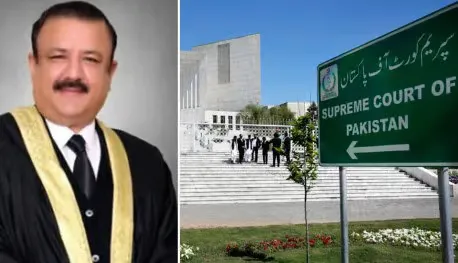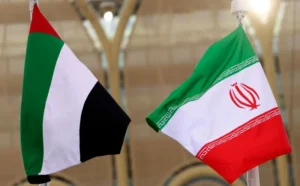![]()
The Supreme Court of Pakistan on Monday suspended the Islamabad High Court (IHC) order that had barred Justice Tariq Mehmood Jahangiri from performing judicial duties.
A five-member constitutional bench, headed by Justice Amin-ud-Din Khan, heard the appeal filed by Justice Jahangiri against the IHC’s September 16 order. Other bench members included Justice Jamal Khan Mandokhail, Justice Muhammad Ali Mazhar, Justice Syed Hasan Azhar Rizvi, and Justice Shahid Bilal Hassan. The apex court also issued notices to relevant parties, including the Attorney General of Pakistan (AGP) office, and adjourned the hearing until tomorrow.
The IHC’s earlier decision, delivered by a two-member bench led by Chief Justice Sardar Muhammad Sarfraz Dogar and Justice Mohammad Azam Khan, had restrained Justice Jahangiri from judicial work until the Supreme Judicial Council (SJC) ruled on a petition filed against him by lawyer Mian Dawood.
Following that verdict, Justice Jahangiri, along with four other IHC judges — Justice Mohsin Akhtar Kiyani, Justice Babar Sattar, Justice Saman Rifat, and Justice Ejaz Ishaq Khan — challenged the order in the Supreme Court.
The controversy centers around Justice Jahangiri’s LLB degree, which was cancelled last week by the University of Karachi (UoK). The UoK syndicate upheld the Unfair Means Committee’s (UFM) findings, declaring that Justice Jahangiri used unfair means and barred him for three years from admission or appearing in examinations. The notification also clarified that he was never enrolled at Islamia Law College, Karachi, in 1989.
Earlier, the Sindh High Court (SHC) had suspended the UoK’s decision, but subsequent petitions were dismissed for non-prosecution. The matter has since sparked legal debate, with defence counsel questioning the maintainability of the petitions and the bench’s refusal to recuse itself.
The Supreme Court’s suspension of the IHC order provides temporary relief to Justice Jahangiri, as the case continues to unfold.














